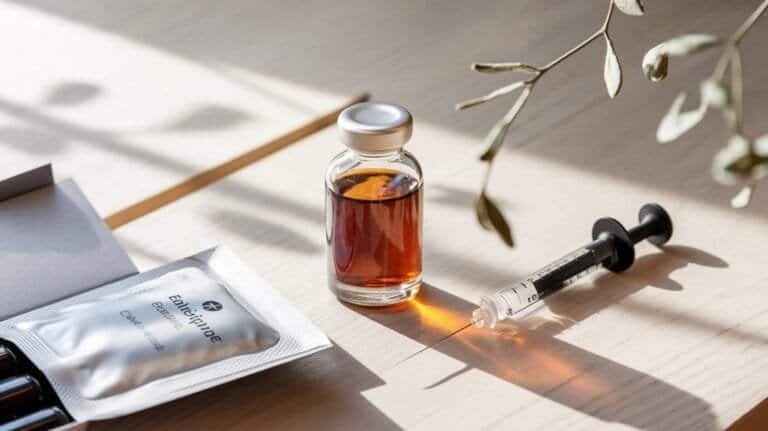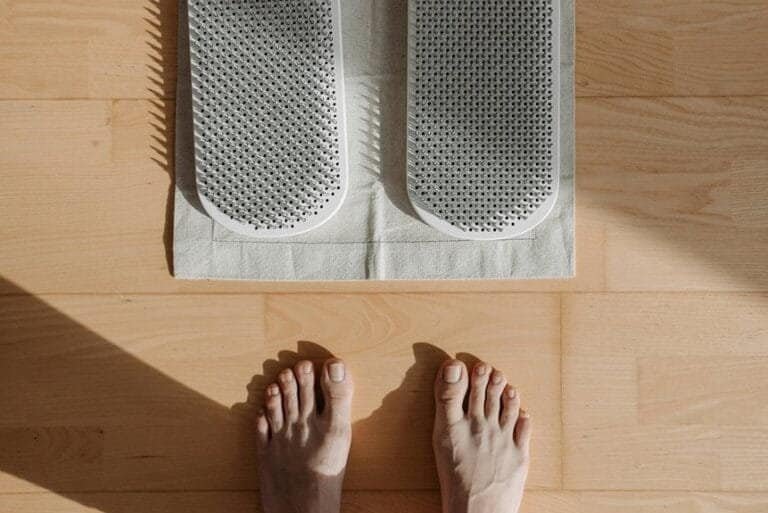Testosterone replacement therapy (TRT) markedly influences your mood and mental health by restoring hormonal balance. Low testosterone levels are linked to mood disorders like depression and anxiety. TRT can reduce depressive symptoms by nearly 15% after a year, while also enhancing dopamine activity for improved mood and cognitive function. You may experience greater emotional stability and reduced anxiety due to improved neurotransmitter interactions and lower cortisol levels. Regular monitoring is essential for safe and effective TRT, ensuring ideal mental health outcomes. Discover more about how TRT can reshape your emotional landscape and cognitive abilities.
Key Takeaways
- TRT helps reduce depressive symptoms by approximately 15% in men with low testosterone, boosting overall mood and emotional well-being.
- Normalizing testosterone levels enhances dopamine activity, leading to improved cognitive function and reduced anxiety.
- Stabilized hormone levels through TRT contribute to emotional resilience and improved stress management by decreasing cortisol production.
- TRT positively impacts cognitive health, improving memory and clarity of thought while reducing brain fog.
- Ongoing medical supervision and monitoring are vital for ensuring effective TRT and managing any side effects.
Overview of TRT and Mental Health

When exploring the link between testosterone replacement therapy (TRT) and mental health, it's essential to understand how low testosterone levels can adversely affect mood and cognitive function.
Research consistently shows that low testosterone, or Low T, is associated with mood disorders like depression and anxiety. The physical symptoms that accompany Low T—such as fatigue, low libido, and weight gain—can compound these effects, leading to a decline in mental well-being. Studies show a correlation between low testosterone and increased risk of depression, which highlights the mental health implications of Low T.
TRT aims to restore hormonal balance by supplementing testosterone through various methods, such as injections. This restoration is significant, as it addresses underlying biochemical imbalances that may contribute to mood disturbances.
A healthcare provider typically prescribes and monitors TRT, ensuring safety and efficacy throughout the treatment process. Regular laboratory tests are essential to assess testosterone levels and adjust treatment as needed.
Incorporating TRT into a broader strategy for mental health can yield substantial TRT benefits. Improved hormonal balance can alleviate depressive symptoms, enhance cognitive function, and foster better emotional regulation, thereby contributing to an overall sense of well-being.
Understanding this connection is important for informed decision-making regarding your mental health and wellness journey.
Mood Enhancement Through TRT

Many men undergoing testosterone replacement therapy (TRT) experience marked improvements in mood, primarily due to the hormone's direct influence on brain chemistry and emotional regulation.
Research consistently shows that TRT can lead to significant reductions in depressive symptoms, particularly in men with low testosterone. For instance, a study found a 15% decrease in moderate to severe depressive symptoms after 12 months of therapy. This isn't a blanket solution for everyone but specifically targets those with hypogonadism, optimizing neurotransmitter engagement, especially serotonin.
Beyond alleviating depression, TRT enhances overall emotional well-being. As testosterone levels rise, dopamine activity increases, which contributes to better mood and cognitive function. Normalizing testosterone levels can further alleviate anxiety and improve overall mood, making daily challenges feel more manageable.
You're likely to notice less irritability and improved energy levels, fostering a more positive outlook. Testosterone's influence on dopamine and serotonin helps you maintain emotional balance and regulates cortisol levels, reducing stress.
Moreover, higher testosterone can enhance motivation and engagement in daily activities, creating a sense of liveliness.
The combination of mood optimization and better emotional regulation results in a calmer, more stable mental state, allowing you to navigate life's challenges with confidence and assurance.
Reducing Anxiety With TRT

An increase in testosterone levels through testosterone replacement therapy (TRT) can considerably reduce anxiety symptoms in men, particularly those with low testosterone. The mechanisms behind this anxiety reduction are rooted in testosterone's influence on neurotransmitters and brain regions associated with emotional regulation. Recent studies have shown that there are higher TRT prescribing rates for men with depression and anxiety, indicating growing recognition of its potential benefits.
| Mechanism | Description | Impact on Anxiety |
|---|---|---|
| Neurotransmitter Interaction | Testosterone enhances dopamine and serotonin | Improves mood regulation |
| Amygdala Modulation | TRT modulates amygdala activity | Reduces emotional responses |
| Cortisol Reduction | Testosterone lowers cortisol levels | Mitigates stress impact |
| Neural Health Support | Enhances cognitive functions like memory and clarity | Alleviates feelings of overwhelm |
Clinical studies reveal significant decreases in anxiety levels among men receiving TRT. For those with conditions like congenital hypogonadotropic hypogonadism, TRT may improve anxiety scores. Additionally, men with depression and anxiety often experience notable improvements following testosterone therapy. Overall, the therapy not only addresses hormonal balance but also enhances daily functioning. TRT helps restore a sense of calm, leading to better emotional stability and mental well-being. Emphasizing these connections can illuminate TRT's potential in managing anxiety effectively for those in need.
Emotional Stability Improvements

Testosterone replacement therapy (TRT) not only alleviates anxiety but also plays a pivotal role in enhancing emotional stability.
By restoring testosterone levels, you can appreciably reduce mood fluctuations and improve your emotional resilience. Low testosterone often correlates with increased irritability and depressive symptoms, which can disrupt your daily life.
Studies have shown that men undergoing TRT experience a nearly 15% decrease in moderate to severe depressive symptoms after a year, enhancing overall mood and motivation. This improvement is largely attributed to the stabilization of testosterone levels, which can lead to more consistent emotional responses.
TRT stabilizes hormone levels, which helps regulate neurotransmitters, such as serotonin and dopamine, that are essential for emotional balance.
As cortisol levels decrease, you're likely to find yourself managing stress more effectively, leading to fewer emotional outbursts and a calmer demeanor.
Additionally, TRT can help mitigate feelings of overwhelm during challenging situations, enabling you to bounce back from setbacks with greater ease.
Cognitive Function and TRT

Cognitive function often takes a hit when testosterone levels plummet, but testosterone replacement therapy (TRT) can turn things around. Studies reveal that TRT positively influences cognitive health primarily by binding to testosterone receptors in the brain. This binding occurs in significant areas like the hippocampus and prefrontal cortex, where it helps mitigate cognitive decline.
Consider these remarkable benefits of TRT:
- Enhances global cognition and verbal memory.
- Improves attention and reduces feelings of brain fog.
- Increases cerebral perfusion in key regions associated with memory and reasoning.
Moreover, TRT supports mitochondrial function and reduces oxidative stress, both of which are essential for preserving cognitive processes. Additionally, low androgen levels in older men are linked to an increased risk of diseases, including cognitive impairment, underscoring the importance of maintaining adequate testosterone levels.
It also prevents the apoptosis of cerebellar granule cells by inactivating pro-apoptotic proteins, meaning that cognitive deterioration may slow down. However, results can vary among individuals, reflecting differences in treatment protocols and personal health factors.
Ultimately, while TRT may not universally resolve every cognitive deficit, its impact on certain cognitive domains underpins its potential as a fundamental intervention for men dealing with low testosterone and cognitive impairments.
Timeline for Mood Changes

As testosterone replacement therapy (TRT) begins to take effect, you might notice a timeline of mood changes alongside improvements in cognitive function.
Initially, within the first week, you may experience enhanced energy, improved sleep quality, and heightened alertness.
By the second week, expect initial mood shifts, such as a boost in libido and morning erections.
Week three typically sees further mood enhancements, with increased mental clarity and reduced stress, anxiety, and irritability.
As you progress to week six, stress levels and cortisol drop considerably, leading to a more stable mood and improved mental acuity.
Between weeks six and eight, reductions in negative moods like tension, anger, and fatigue become evident.
By the end of month three, your emotional stability will likely be further reinforced with sharper concentration and better memory.
In the longer term, by month four, you'll notice improved endurance and reduced sleep deprivation.
Come month five, symptoms such as sadness and mental fatigue often diminish.
Finally, after six months, many patients report maximum benefits, experiencing less anxiety and depression.
Consequently, the timeline illustrates how TRT can drive profound, long-term effects on mood and overall mental health.
Managing Potential Side Effects

Steering through the potential side effects of testosterone replacement therapy (TRT) requires a proactive approach to managing mood fluctuations and emotional well-being. By implementing effective adjustment techniques, you can better navigate these changes.
Adapting treatment schedules, for instance, allows doctors to time testosterone injections to minimize mood swings, particularly as they taper off. Regular monitoring of hormone levels contributes to stabilizing your mood as well.
To bolster your emotional resilience, consider incorporating the following support resources:
- Engage with online support groups to share experiences and combat feelings of isolation.
- Seek psychological therapy for coping strategies tailored to manage the emotional impacts of TRT.
- Collaborate with healthcare professionals for medication adjustments if underlying mental health issues arise.
Recognizing the temporary nature of mood changes is vital. These fluctuations often signal your body's adjustment to new testosterone levels.
However, if these changes become severe, prompt consultation with a mental health professional is essential. Utilizing both adjustment techniques and available support resources can greatly enhance your overall mental health during TRT, ensuring a more balanced emotional state.
Importance of Medical Supervision

Medical supervision plays a significant role in guaranteeing the safe and effective implementation of testosterone replacement therapy (TRT). With regular treatment monitoring, healthcare providers can adjust your plan based on your hormone levels and unique health conditions. This individualized approach is vital, as it maximizes benefits while reducing potential risks.
By consulting a qualified healthcare provider, you proactively address any concerns related to unauthorized testosterone use, which can lead to unmanaged side effects. Medical supervision assures your TRT is conducted under legitimate protocols, using safe, authentic testosterone products.
Moreover, ongoing medical oversight enables early detection of complications, allowing for timely interventions that enhance both your physical and mental health outcomes. Regular assessments confirm your testosterone levels remain ideal over time, while healthcare professionals integrate lifestyle recommendations to further boost efficiency.
Ultimately, effective medical supervision not only stabilizes mood and reduces anxiety through regulated hormone levels but also helps monitor and adjust your treatment plan in response to any mental health changes.
Prioritizing medical guidance during TRT is essential to achieving lasting benefits and safeguarding your overall well-being.
Frequently Asked Questions
Can TRT Be Used for Women Experiencing Mood Issues?
You might find that TRT offers some benefits for emotional stability and hormonal balance, especially if your testosterone levels are low. However, evidence remains mixed, and individual responses may vary based on unique hormonal profiles.
How Does Diet Affect the Outcomes of TRT?
Think of your diet as a symphony; every nutrient plays a role. Proper hormone balance and optimized nutrient absorption directly affect TRT outcomes, enhancing effectiveness. A meticulously crafted diet elevates your overall health and hormone performance.
Are There Alternative Therapies to TRT for Mood Improvement?
Considering alternatives for mood improvement, you might explore herbal remedies like St. John's wort or cognitive therapies such as cognitive behavioral therapy, both showing potential in enhancing emotional well-being and providing effective support for mood regulation.
What Role Does Exercise Play in Conjunction With TRT?
Exercise can be a game-changer, magnifying TRT's effects by enhancing hormone balance. You'll experience exercise benefits like increased motivation and energy, making workouts more effective and improving your overall well-being when combining both strategies.
Can Lifestyle Changes Amplify the Effects of TRT on Mental Health?
Yes, lifestyle modifications can considerably enhance TRT's effects. By promoting hormone balance through nutrition and exercise, you'll experience improved mood stabilization and mental clarity, ultimately optimizing your overall mental health and well-being.
Conclusion
Incorporating TRT can be like tuning a finely crafted instrument; just as a slight adjustment can harmonize its tone, TRT aligns your hormonal balance, leading to improved mood and mental clarity. Research suggests that over 60% of men report enhanced emotional well-being after treatment. However, remember that each body is unique, so regular check-ins with your healthcare provider guarantee that the symphony of benefits continues without discord from potential side effects. Prioritizing professional guidance is essential for ideal results.






